IN A REMARKABLE language game at the 65th birthday of Dr Kole Shettima of MacArthur Foundation earlier in February 2025, Nigerians heard from the organisers that unless people like Dr. Kole were critically celebrated, the perception that there are no Nigerians standing above the current decay of values could become established even when there are such persons already serving as beacons for the possibility of recovery. The language game immediately transported some observers to a similar banner-of-hope exegesis in August 2010 at the 50th birthday of Comrade John Odah.
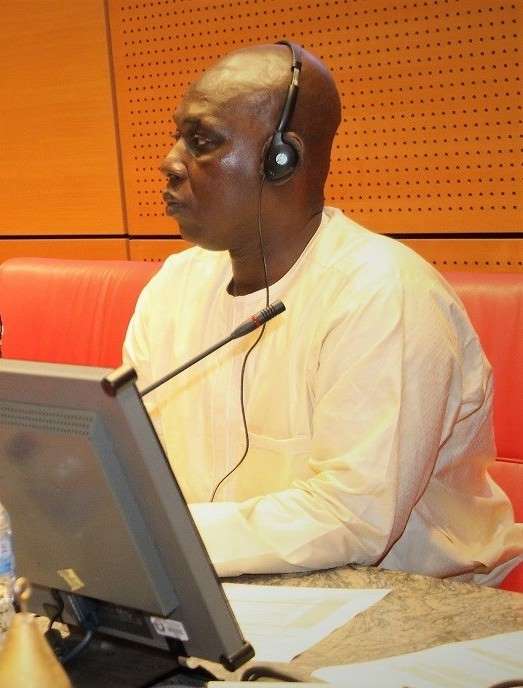
Comrade Labaran Maku, the then Minister for Information who was Chairman of the occasion described John Odah as part of the squad that led Nigerian students’ onslaught on military dictatorship throughout the eighties and in the defence of the dignity of the African and the idea of standing up for democracy. John, said Maku, is not someone who puts himself in the front but a permanent mastermind “of the massive action you see in the front”, calling John an activist “whose sense of commitment could cut through any mountain, a real product of communal upbringing in the rural society and its high sense of value, propriety and culture”. In not many weeks from now, another member of this emerging ‘Caucus’ will also be 65 and it will not require much research to find a past reading of him in the same category as Kole and John Odah. The ‘Caucus’ chair has not ruled yet but no one would be surprised if his ruling is that there will be a symbolic party for him and that it will take place in Jamma’re or Azare or even Bagauda Lake.
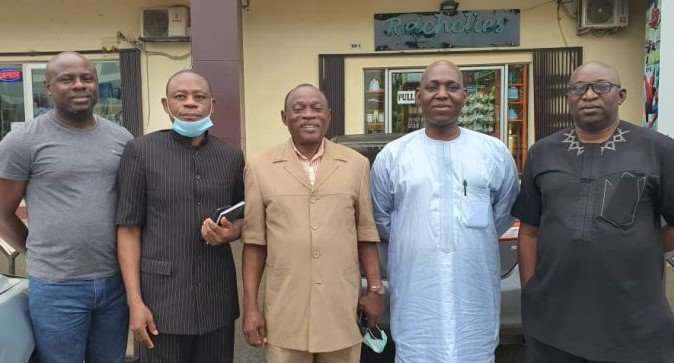
The 65th birthday anniversary for people like the Kole Shettimas, John Odahs, the Jibrin Ibrahims, the Femi Falanas, the YZs and all those covered in that generational bracket across Nigeria cannot be about the numerical when, at 100 years, Mahathir Mohammed, for instance, is still in politics. He is to the extent that, on his 100th year last July (2025), he told his television interviewer that, among others, he is still able and is writing books on his experiences in power. Writing is the acumen of politics. That makes Mahathir our best example against agism. Besides writing, there is still nothing he doesn’t eat except bananas which his doctors have warned him against. But he remains a social media activist at his own level, cycles when he is able to and receives his visitors as before. After ruling Malaysia as Prime Minister for nearly three decades, he left office but only to be dragged back to contest, win election and return to power in 2018 at the age of 93. Of course, it is difficult to compare a West African with an East Asian basically because the eating regimes of the two are too far from each other. Mahathir is most likely to be intact at 100 as a result of overwhelming sense of fulfilment for leading Malaysia into industrial civilisation. That is one thing many have not been able to do, especially in Africa where most leaders are even so scared to try.
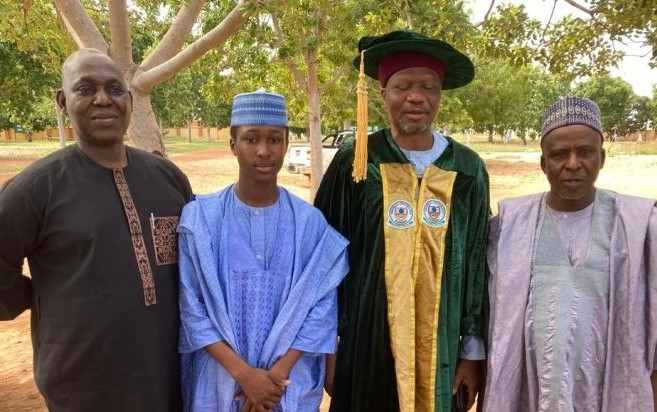
If the birthdays in question do not fit into the routine social practice nor the numerical and if each of the three names can only be understood in relation to all their fellow travellers in the struggle for human rights, gender equity, democracy and a sane society in the 1980s and the 1990s, then the high scores entered for each them by a grateful society leads us to the inference that their birthdays are a continuation of the tradition of radical democratic politics.
It is a different argument that radical democratic politics is actually in an incomprehensible slumber in Nigeria at the moment. The joy, however, is that the leading lights of the moment under reference have not burnt out. If anything, they are actually thriving, making contributions which that set or generation alone have had the grooming to accomplish. That is an easily demonstrable claim.

We started by mentioning Kole Shettima who has a record of democratising philanthropy in a way that has not been the case. By democratising, we mean that he is administering MacArthur Foundation as Africa Director in a way that is exclusionary of no sector, gender, region, religion or whatever else. There are others and Prof. Jibrin Ibrahim is one of them. He is, unbelievably, so melted that if he were the president, no one who honours a presidential dinner with him will have cause to look over his or her shoulders for disagreeing with the president. And if there was a debate at the dinner table in which the president’s position was defeated, this president will still summarise the outcome very fairly. Last December, Prof Jibrin Ibrahim turned 70. He has been a pillar of this tradition.
There is Femi Falana, the Lagos lawyer who is slightly below Ibrahim in age. No matter what anyone may say about, for or against Femi Falana, he is about the only one in Nigeria today who is approaching radical politics through immanent critique. That is a record because immanent critique is almost the major lone survivor from the contributions of the Frankfurt scholars as most of their points of departure have been overturned by other theorists and/or subsequent developments.
Let’s not forget to mention Prof Adele Jinadu for the energy to do what he is doing at his age. At over 80, he is fully involved in the discursive struggles. That, too, is a record, the discursive battlefield being where the struggle is concentrated at the moment following the reconceptualisation of hegemony from its Leninist sense to the articulatory alignment of elements towards producing the sort of power relations which alone can make any change possible.
The reasons for mentioning Prof Jinadu are compelling for mentioning Prof Bolaji Akinyemi on this list. Even at his age, he is still firing, making use of television appearances in a manner that belies the notion of him as a privilege-minded elite. Intervention has maintained before that the Akinyemi who gave his October 1992 interview to the now defunct Newswatch cannot be called a conservative because there are too many assertions in the said interview to support a rather radical Akinyemi thesis. Even though he is not the Akinyemi of ‘Farewell to Policy’ gaze anymore, he definitely made Nigerians proud by being about the only expert talking during the recent Israel-Iran war. A Nigerian voice on that conflict is not the same thing as any other voice. The paucity of expert Nigerian voices on that conflict should worry anyone who knows what voice is in world politics today. The paucity raises the question of where younger Nigerian experts in deterrence, power and de-nuclearisation in contemporary world politics have gone to. What if an Akinyemi were not around?
What do we say on John Odah, the celebrant, in relation to embodiment of the kinds of values that can save the society? Cde Labaran Maku has told us one level of Odah’s role in the tradition. There were other roles Odah played in the other spheres of opposition to authoritarianism in this country during the period under reference. They include the human rights sphere (Civil Liberties Organisation – CLO in particular; gender sphere – Women in Nigeria – WIN; June 12 during which some people became veterans of NADECO route through Ghana and, above all, becoming the chief technocrat of the Nigeria Labour Congress – NLC) which, for a long time, provided the umbrella for the different shades of radicalism. But his more enviable role was bringing Nigeria to a dialogue of the Left and the Right wings in Nigerian politics. That is what happened at John’s 50th birthday in 2010 as can be seen clearly from the excerpts from a newspaper report on that event below:
“Comrade Peters Adeyemi, Deputy President of the NLC and Chairman of the Committee of Friends that put together the birthday bash justified the bash in terms of Comrade John having made the kinds of contributions that needed to be acknowledged, saying the occasion provided an opportunity to continue to reflect on the state of the nation”.
“NLC President, Comrade Abdulwaheed Umar, re-enforced the image of the General Secretary as a radical combatant who “from the labyrinthine trenches of struggle against military despotism to the gruesome marches in defiance of the antagonists of the working class, Comrade Odah has remained a consistent comrade, patriot, progressive and defender of human rights and dignity”
“Dr. Festus Iyayi delivered his lecture provocatively titled, “Assassins of Nation Building, 2011 Elections and Electoral Reforms in Nigeria: Chronicle of a Death Foretold”. Iyayi’s leading argument is that Nigeria is not yet a nation because the Nigerian ruling class whose responsibility it is to build a nation neither understands nor accepts the responsibility for building the disparate groups in Nigeria into a nation”
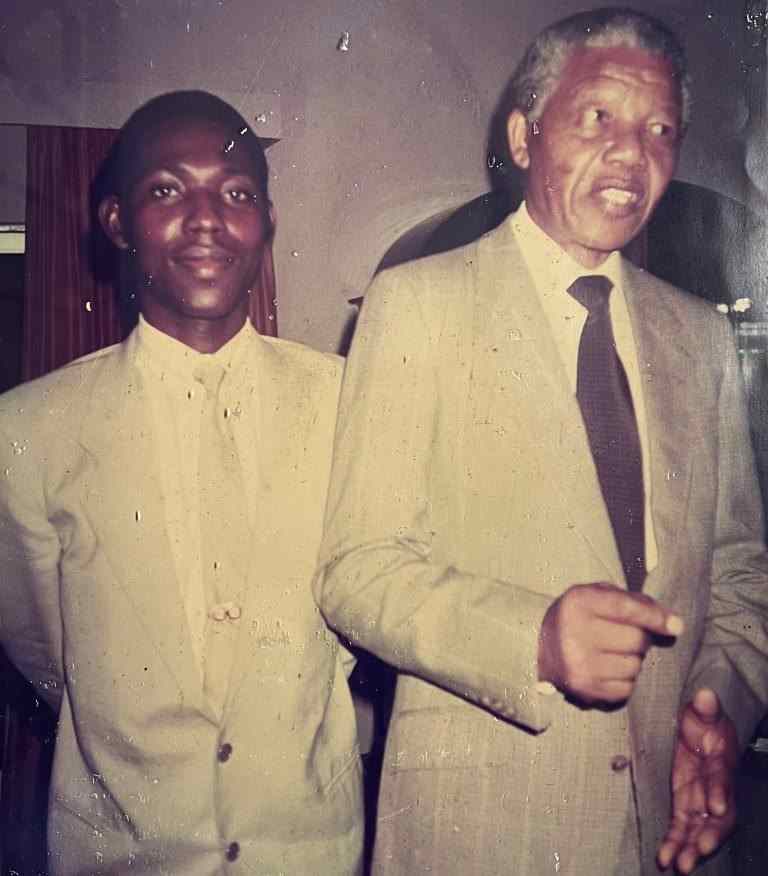
“They are, instead, assassins of nationhood and nation building in the sense that every ruling class that succeeds at nation building offers some specific and spectacular achievement that feeds upon and promotes a sense of national pride and hence identity. The British bourgeoisie not only built roads and industries, it also built an empire. So also the Americans. But unlike the British, American, Japanese or China, Singaporean or Brazilian, Cuban or Indian ruling class, the Nigerian ruling class has none of the tangible and intangible elements towards a unifying image of the national communion. So, the ethnic paradigm reigns supreme. And poverty too”
“But painful as these evidences may be, they pale into insignificance when it is noted that Nigeria is about the only country which celebrates its slavery of the British and American empires. It is such that with very few exceptions, the word resistance is not in the vocabulary of the members of the Nigerian ruling class at all”
“He gave other examples of ruling class decadence, citing the Nigerian ruling class as the only ruling class which does not produce toothpick, yet, its members insist on eating caviar for breakfast and ride around in hummer jeeps and private jets, the class which does not know how to forego today’s pleasures in order to achieve longer term rewards tomorrow, a class so corrupt it has to rely on foreign collaborators to consolidate corruption as the national culture, to the extent that there are, for example, no meters installed at the terminals where crude oil is taken by global oil companies. Instead, it is the buyers who tell the seller how much has been sold”
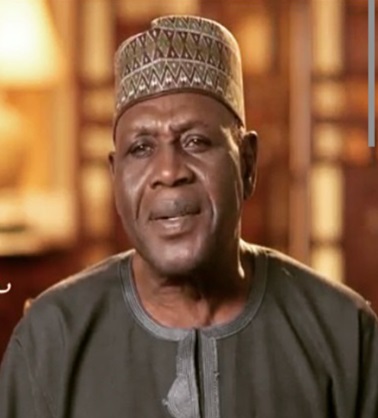
“The rulers of Nigeria have been told in dreams, market places, pulpits, conferences, newspapers, beer parlours, barber shops … that unless there is a change in their practices and attitude towards politics, elections and corruption, the nation will not survive. Even a date, 2015 has been prophesized as one when the country may well implode. However, in spite of repeated warnings from sages and prophets, the ruling class in Nigeria continues to drive itself to perdition”
“Comrade Sylvester Ejiofor, the veteran’s veteran of labour movement in Nigeria endorsed the celebration of John Odah because it is the celebration of a position he took at a critical time by going underground with the caucus at the height of the military’s assault on Nigeria, linking up externally and keeping faith generally”
“For him, Prof Iyayi had reminded all of us that any system that is dysfunctional has a terminal date and that our ruling class does not know its mission. The problem, for him, is that unlike when behind the AG was a collective of intellectuals or when Okpara’s party opposed Awo’s Democratic Socialism with Pragmatic Socialism or the NEPU posed Democratic Humanism, the field of play today is ideologically barren political parties. He put the blame squarely on prolonged military rule, particularly the military that imposed SAP on Nigeria”
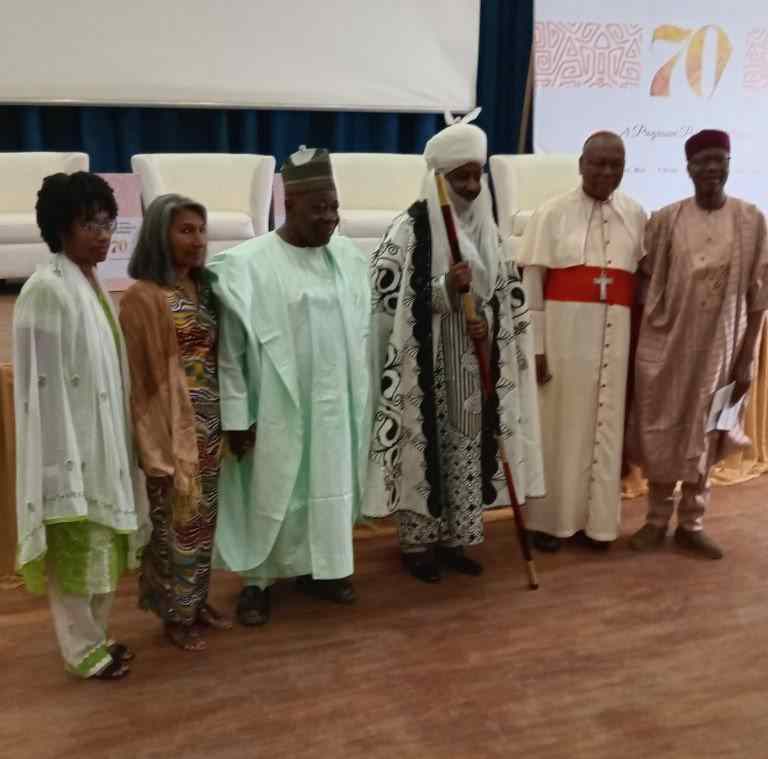
“Other speakers such as Dr. Yima Sen, Abiodun Aremu, Ngukwase Chia Surma, Ene Edeh and Frank Kokori basically agreed with Iyayi, with Kokori saying, among others, that “There are no nationalist parties in Nigeria in the way that there is SWAPO in Namibia or ANC in South Africa or FRELIMO in Angola”.
“Then enter Kingibe, aka ‘sai Baba’. He had sat through until his assumption of the Chairmanship of the segment. Using the Chairmanship position to make a few comments, Kingibe said he had known John Odah for the only three years, beginning from the 2007 oil price hike negotiations between the FG and the NLC. For Kingibe, John represents an effective trade unionist, “one who didn’t shout, who eschews clichés and who didn’t use ideologically tainted words “that mean nothing”. “John as a negotiator presents you little windows so that you can escape, an approach which creates opportunity for dialogue. With John, there is no confrontation, no bravura. I hope you would evolve common grounds which will recognize that something which is wrong is wrong, which is false is false”.
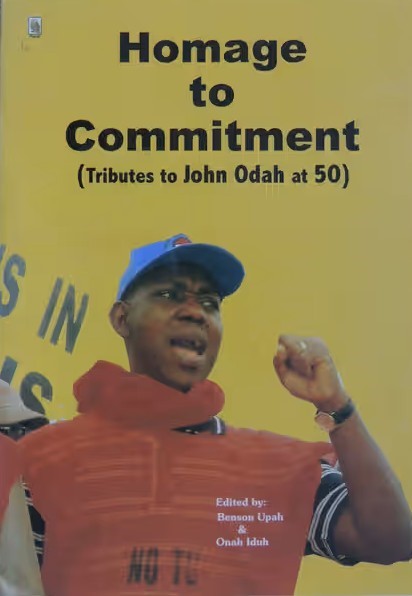
“He said that everything Iyayi has said could be said differently in a less alienating language. If you say we don’t have a nation, then we cannot have a ruling class, said Kingibe in response to Iyayi’s thesis. It was an issue he didn’t pursue beyond his argument that part of the problem is that slogans have a way of acquiring the authority of truth when used repeatedly. His own strategic response to the challenge of nation building is the option of what he called ‘informed debate’, insisting that there should be a movement from mutual disdain to mutual respect such that a statement like “people who think it is their birth right to rule” would not be made”.
When taken together, it means a John Odah who has fulfilled the definitive requirement for political leadership in most organised countries: the requirement of a key sacrifice for the survival of one’s country. He, along with names used to demonstrate a living radical democratic tradition here constitutes the real hope at a time when too many things have gone too far below the threshold in Nigeria. This is not necessarily about the Tinubu assemblage in power but also about the degree of mediocrity, the absolute lack of any sense of urgency in responding to the multiple creases any and everywhere in the country and the hollowing of everything settled and sacred about Nigeria.
Thanks be to God that the presiding Chairman of the ‘Caucus’ has ruled that there will be a fish party for John Odah to mark the 65th birthday, meaning that John’s case for keeping it low-key was democratically rejected. As the Court pleases!
Culled from INTERVENTION


